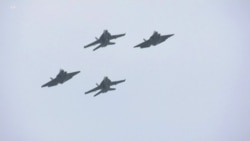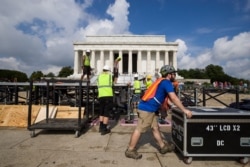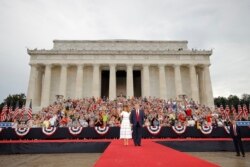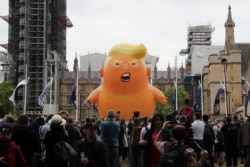U.S. President Donald Trump's decision to host a massive "Salute to America" extravaganza on the nation's 243rd birthday has some critics calling for an investigation into how taxpayer money may have been used to finance the event.
Trump played host Thursday evening in Washington for what he called "The Show of a Lifetime" to celebrate the U.S. Independence Day holiday. Trump directly took charge of the celebration, by introducing military jet flyovers, patriotic music and a display of military tanks.
Amid tight security and soggy weather, Trump delivered a long speech at the Lincoln Memorial. It was the first time in nearly 70 years that a sitting U.S. president had spoken on Washington's National Mall - a long grassy area that houses several monuments - to mark the holiday festivities.
While the final price tag for Independence Day event is not known, The Washington Post reported Tuesday the National Park Service was diverting $2.5 million in entrance and recreation fees to cover costs. Trump tweeted the cost "will be very little compared to what it is worth." The National Park Service falls under the purview of the Department of the Interior.
Two groups — the non-profit Democracy Forward and the nonpartisan National Parks Conservation Association — are urging the department's Office of the Inspector General to investigate what they say may be a "potentially unlawful decision to divert" national parks funds for the July 4 event. In a recent statement, the groups said the move "potentially violates a federal law that allows these visitor fees to be used only for specific purposes related to enhancing visitor experiences..."
Criticism also came from former Vice President Joe Biden, one of the two dozen or so Democratic candidates seeking to make Trump a one-term president. In remarks in Iowa, Biden said the event in Washington was to "stroke" Trump's ego.
It is not clear how many people turned out for the Salute to America event on the National Mall; but, before leaving the White House Friday for a trip to Bedminster, New Jersey, Trump said, "We had a phenomenal crowd last night." He also said, "Last night was spectacular." He predicted the event would draw a lot of recruits into the U.S. military.
The Fourth of July festivities commemorate America's declaration of independence from Britain in 1776.
Trump called the history of the United States "the epic tale of a great nation of people who have risked everything for what they know is right and what they know is true."
There were fears Trump would turn the nation's birthday party into a political event by talking about what he feels are his accomplishments as president.
But he made no mention of politics, next year's election or the Democratic candidates seeking the White House. Trump avoided talking about what divides Americans and spoke of what unifies them.
"As we gather this evening in the joy of freedom, we remember that we all share a truly extraordinary heritage. Together, we are one of the greatest stories ever told," the president said. "Americans love our freedom and no one will ever take it away from us...our nation is stronger today than it ever was before."
Trump paid special tribute to each branch of the U.S. military and appealed to young Americans to consider making the military a career.
But many who live in Washington were angry that the Pentagon and security officials commandeered areas of the National Mall where the public usually gathers for celebrations.
Others were upset the White House handed out tickets for seats to Trump's speech only to Republicans loyal to the president.
Anti-Trump protesters were highly visible along the mall all day, including the now familiar blimp depicting Trump as an angry baby in a diaper. Vendors sold mini-Trump baby balloons on wooden sticks for demonstrators to wave.
Protesters included military veterans who said they resented someone who never served in the military exploiting their service for his satisfaction. Trump supporters in red "Make America Great Again" hats confronted some of the protesters, but their debates were civil and free of insults and name-calling. Parades, picnics and fireworks took place in other parts of the United States as well.










